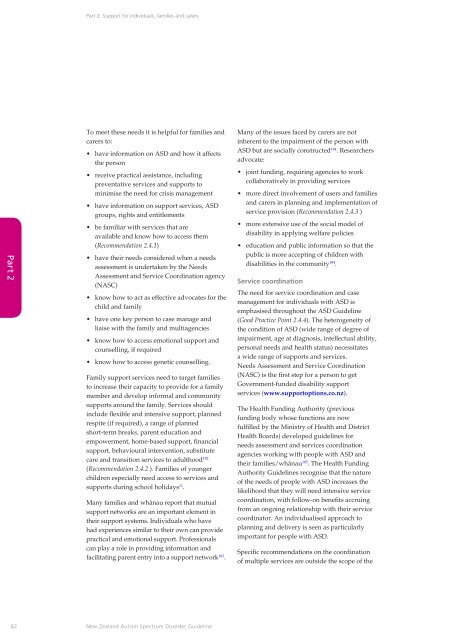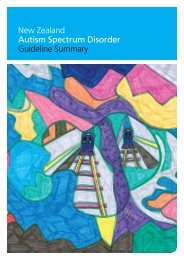New Zealand Autism Spectrum Disorder Guideline - Ministry of Health
New Zealand Autism Spectrum Disorder Guideline - Ministry of Health
New Zealand Autism Spectrum Disorder Guideline - Ministry of Health
Create successful ePaper yourself
Turn your PDF publications into a flip-book with our unique Google optimized e-Paper software.
Part 2: Support for individuals, families and carers<br />
Part 2<br />
To meet these needs it is helpful for families and<br />
carers to:<br />
• have information on ASD and how it affects<br />
the person<br />
• receive practical assistance, including<br />
preventative services and supports to<br />
minimise the need for crisis management<br />
• have information on support services, ASD<br />
groups, rights and entitlements<br />
• be familiar with services that are<br />
available and know how to access them<br />
(Recommendation 2.4.1)<br />
• have their needs considered when a needs<br />
assessment is undertaken by the Needs<br />
Assessment and Service Coordination agency<br />
(NASC)<br />
• know how to act as effective advocates for the<br />
child and family<br />
• have one key person to case manage and<br />
liaise with the family and multiagencies<br />
• know how to access emotional support and<br />
counselling, if required<br />
• know how to access genetic counselling.<br />
Family support services need to target families<br />
to increase their capacity to provide for a family<br />
member and develop informal and community<br />
supports around the family. Services should<br />
include flexible and intensive support, planned<br />
respite (if required), a range <strong>of</strong> planned<br />
short-term breaks, parent education and<br />
empowerment, home-based support, financial<br />
support, behavioural intervention, substitute<br />
care and transition services to adulthood 182<br />
(Recommendation 2.4.2 ). Families <strong>of</strong> younger<br />
children especially need access to services and<br />
supports during school holidays 11 .<br />
Many families and whänau report that mutual<br />
support networks are an important element in<br />
their support systems. Individuals who have<br />
had experiences similar to their own can provide<br />
practical and emotional support. Pr<strong>of</strong>essionals<br />
can play a role in providing information and<br />
facilitating parent entry into a support network 183 .<br />
Many <strong>of</strong> the issues faced by carers are not<br />
inherent to the impairment <strong>of</strong> the person with<br />
ASD but are socially constructed 184 . Researchers<br />
advocate:<br />
• joint funding, requiring agencies to work<br />
collaboratively in providing services<br />
• more direct involvement <strong>of</strong> users and families<br />
and carers in planning and implementation <strong>of</strong><br />
service provision (Recommendation 2.4.3 )<br />
• more extensive use <strong>of</strong> the social model <strong>of</strong><br />
disability in applying welfare policies<br />
• education and public information so that the<br />
public is more accepting <strong>of</strong> children with<br />
disabilities in the community 184 .<br />
Service coordination<br />
The need for service coordination and case<br />
management for individuals with ASD is<br />
emphasised throughout the ASD <strong>Guideline</strong><br />
(Good Practice Point 2.4.4). The heterogeneity <strong>of</strong><br />
the condition <strong>of</strong> ASD (wide range <strong>of</strong> degree <strong>of</strong><br />
impairment, age at diagnosis, intellectual ability,<br />
personal needs and health status) necessitates<br />
a wide range <strong>of</strong> supports and services.<br />
Needs Assessment and Service Coordination<br />
(NASC) is the first step for a person to get<br />
Government-funded disability support<br />
services (www.supportoptions.co.nz).<br />
The <strong>Health</strong> Funding Authority (previous<br />
funding body whose functions are now<br />
fulfilled by the <strong>Ministry</strong> <strong>of</strong> <strong>Health</strong> and District<br />
<strong>Health</strong> Boards) developed guidelines for<br />
needs assessment and services coordination<br />
agencies working with people with ASD and<br />
their families/whänau 185 . The <strong>Health</strong> Funding<br />
Authority <strong>Guideline</strong>s recognise that the nature<br />
<strong>of</strong> the needs <strong>of</strong> people with ASD increases the<br />
likelihood that they will need intensive service<br />
coordination, with follow-on benefits accruing<br />
from an ongoing relationship with their service<br />
coordinator. An individualised approach to<br />
planning and delivery is seen as particularly<br />
important for people with ASD.<br />
Specific recommendations on the coordination<br />
<strong>of</strong> multiple services are outside the scope <strong>of</strong> the<br />
82<br />
<strong>New</strong> <strong>Zealand</strong> <strong>Autism</strong> <strong>Spectrum</strong> <strong>Disorder</strong> <strong>Guideline</strong>











